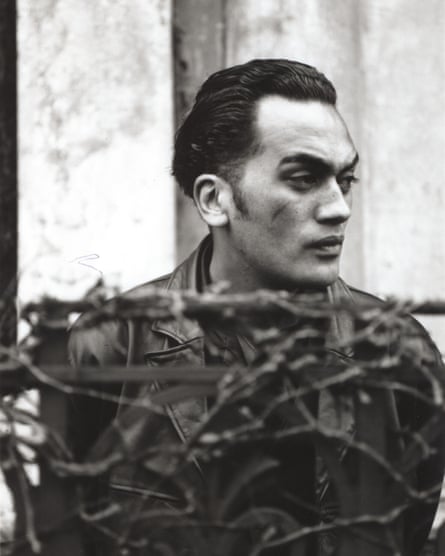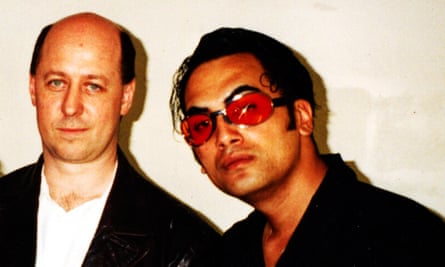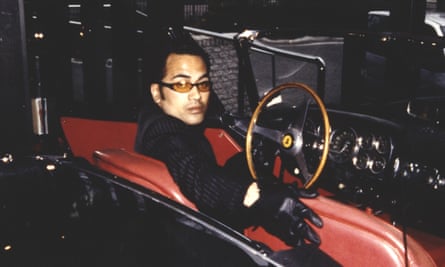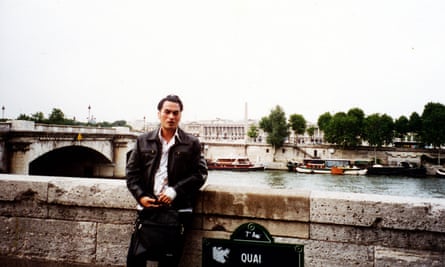Twenty-seven years ago this April, a curious Kiwi track jumped to No 1 on the Australian music charts. How Bizarre by OMC (which stands for Ōtara Millionaires Club, made up of frontman Pauly Fuemana and producer Alan Jansson) was the little song that could, eventually taking out No 1 in five countries, topping the US Mainstream Top 40 and reaching No 5 in the UK.
Fuemana’s captivating brand of Pasifika gangster-rap-lounge-lizard swagger was born out of duality: his troubled childhood in Ōtara combined with the vibrancy of 1990s High Street, then the epicentre for Auckland’s youth culture, fashion and music. When How Bizarre became a hit, Fuemana’s life turned into a chaotic collage of international travel, VIP treatment and live appearances spanning UK’s Top of the Pops to Australia’s Hey Hey It’s Saturday. All pretty overwhelming for a 26-year-old who’d never been on a plane until he flew to Sydney to sign his record deal.
Unsurprisingly, the steep ascent to fame and the resulting millions – Fuemana said he had made NZ$5m in royalties from the song by 2007 – lead to creative differences and legal wrangles. Branded a one-hit wonder, Fuemana stepped out of the spotlight in 1998. That same year, the song’s co-writer, Alan Jansson, sued Fuemana for lost royalties. The matter was settled in arbitration.
The pair reunited in 2007 to work on the OMC song 4 All of Us, featuring Lucy Lawless, a year after Fuemana was declared bankrupt. But even then, it was clear he was unwell: he died three years later from respiratory failure resulting from an auto-immune disorder, leaving behind his wife, Kirstine, and their six children.
Today, a new generation of listeners has fallen in love with the track, which has been streamed more than 150m times on Spotify and has generated billions of views on TikTok as an audio meme. More importantly, How Bizarre remains a cultural icon, symbolising New Zealand’s coming of age in the 1990s – the decade where Kiwis realised that anything was possible.
‘They said we couldn’t do it’
Alan Jansson (OMC member, producer): My record label guy back in the day told me I had a better chance of winning the lottery than having a No 1 in America. It drove me nuts. So I set that as a goal.
Simon Grigg (owner of The Box and Cause Célèbre nightclubs in the 90s and Huh! Records): We were told over and over, you can’t do it from New Zealand. I had owned record labels all through the 1980s, it was hard. You’re dealing with the time delay. We were lucky that the internet arrived around the same time, but even then, you still couldn’t send an MP3 file. It was all done on cassette.
Pauly was one of the cool guys around my clubs, Cause Célèbre and The Box. One of the great things about the clubs was the multiculturalism – if you were cool enough, you got in.
Adam Holt (record executive, now head of Universal Records New Zealand): You’ve really got to point to Simon and that early nightclub scene. He came from punk rock and a lot of the boot-boys were Polynesian or Māori. We always saw a multicultural audience. It came into sharp focus at Cause Célèbre and The Box. That was inner-city Auckland at that time, and Pauly came out of that.
Jasmin Chew (backing singer and actor in the music video, now a lawyer): The song was born from the High Street scene, where every cafe, fashion boutique and club was in a one-kilometre radius. High Street was the epicentre of creativity.
Grigg: Because the internet wasn’t around, and because of our geographic isolation, we had a very skewed view of the world. Now, every time Rihanna puts a tweet up, the whole world knows what she’s said. But back then, we saw everything through a strange filter of three-month-old magazines. At The Box we tried so hard to be in-touch; I had a credit card with a record shop in Manchester and I said to the guy, “Every week I want your five hottest records.” He’d send me a box every two weeks – that’s how we managed to stay ahead.

‘Pauly was like a Polynesian Elvis’
Chew: I met Pauly socially at The Box when I was 18. He was so stylish: denim jacket with a leather collar, Johnny Reb boots, cool ethnic shirt. Like a Polynesian Elvis. He was extremely shy and humble, very softly spoken. And so respectful. He was a true star.
Holt: Pauly was so mercurial and so cool. Everyone else was wearing hip-hop gear and there’s Pauly in his plaid jacket. He was also the boldest artistically. He got a bit of shit from his peers – “you’re selling out” – but he was fearless. He knew he wanted to do things differently.
Jansson: There was a bang on the studio door and it was Pauly. “Has your brother Phil sent you to beat me up?” I said. I was quite scared of Pauly on a creative level, not physically. He was just way ahead of anyone and he could think outside the box. He said, “Bro, is it OK if I hang out with you?” He loved being in the studio because it had a big solid door and he felt safe.
He was really artistic too. He wanted to go to Elam [the fine art school], but wanted to do music first. He asked me how long he should give it, and I said, “Give it three years, Pauly. If we don’t have a hit in three years, go to Elam.”
Chew: The world was looking for someone that looked like him, with his style, swagger and voice. Spoken-word, rap – he was way ahead of his time. He was extremely talented and was given the offer of his life. He wasn’t quite sure, but when it blew up, he didn’t look back.
‘I knew we had a huge hit – but how do you turn it into an international hit?’
Grigg: Alan and I have known each other since the early 80s. I thought his Proud compilation [a hip-hop and R&B compilation showcasing mostly Pasifika talent] was the best thing I’d ever heard. I said to him at the time, “If you’re doing anything else, I want first option.” He told me he was working with a guy who hangs out in my club. It was Pauly.

Jansson: I was asked to bring over the Proud bands for Australia’s Big Day Out, but the only ones who wanted to sign the contract were Pauly and Sina. We wrote eight songs for the set one night in the studio kitchen; How Bizarre was one of them. I showed Pauly the chords and I strummed it to him: C, G and F. Pauly said, “Wow, that’s cool.” That’s when he came up with, “Every time I look around.” And then he went, “You’re not there,” but I changed it to, “It’s in my face.” We put it all together and worked up the raps. I remember Sina saying she’d never heard anything like it in her life.
When we did the Auckland Big Day Out, the whole rap community got up and walked out, to show they didn’t approve of what we were doing. I was disgusted. When we got to Sydney, there was only about 50 people there. Pauly sang brilliantly and talked to the Samoans in Samoan and the Māori in te reo. They loved him.
There was a guy at the back with a cowboy hat and crocodile skin boots – it was Clinton Walker from Rolling Stone magazine. He kept saying that Pauly was the Marvin Gaye of the Pacific. “Mark my words,” he said. “How Bizarre is going to be huge.” When we left New Zealand no one wanted to know us, but when we got back, there were people waiting for us at the airport! That was because we got the middle two pages of Rolling Stone. That was the beginning of it all, really.
Grigg: Alan started playing me stuff. We knew it had something special and part of it was Pauly’s rap. That nasal talking thing. Not classic hip-hop. Even then, Pauly kept saying, “I’m not a hip-hop artist.” But he also said he wanted to be famous – yeah OK, let’s make the record first! So I gave Alan NZ$5,000 to record some songs. It was a lot of money back then.
Around June 1995, Alan played me a finished version of How Bizarre. It was phenomenal. Pauly came into the room and we hugged. I said, this is going to be massive. That was the moment. I knew we had a huge hit on our hands. But the big question was, how do you turn it into an international hit?
Jansson: I said to Pauly, do you realise if this is No 1 around the world, it should make you about NZ$4m and me about NZ$2.5m? He thought I was crazy. But when that money started coming in, he said, “How did you know, bro?”
Chew: The success of that song is due to a lot of things. Alan Jansson is a genius. He knows how to make a hit. But to have Pauly front it with his unique persona and voice, and with the mariachi, the trumpet, Sina’s vocals. That’s magic.

‘The music video was a seat-of-the-pants thing’
Grigg: For the How Bizarre video, we invited cool kids from the club to come along and six or seven people did. It was a seat-of-the-pants thing, all thrown together at the last moment.
Chew: I remember thinking it was kind of cheesy, but that it could work. It felt really fun but we didn’t know if it was going to go anywhere. I got paid three CDs! We were young and I have no regrets – that’s what you did to support your friends.
Grigg: I knew Adam Holt, who was the head of Polydor in Australia, so got on a plane to play it to him. That was one of the pivotal moments in the whole thing. As Alan and I were driving into Sydney, I said, “This is either going to be a worldwide smash or we’re mad.” Alan said, “We’re not mad.”
Holt: Simon and Alan came into my office. The walls were really thin – when they put the cassette on, it was instant. My boss came straight out of his office and said, “What the hell’s that?” He said right away that it was going to be a top five hit. It was undeniable. Anyone with a pair of ears could have heard that.
Grigg: Adam said, “I give you my word, this will be No 1 in Australia.” And he was good to his word.
Holt: It sounded like nothing you’ve heard before, and it sounded like everything – Spanish Stroll, Herb Alpert, Polynesian rap. Pauly’s delivery was so iconic. The influences were all over its sleeves, but it sounded like nothing else. They’re the songs that break through.
‘A hit in New Zealand used to stay in New Zealand’

Grigg: It was overwhelming. Australia was full-on – especially the racism Pauly faced there, it was ugly. But when we got to the UK, it turned into another thing entirely. It just steamrolled. And then America. It was madness. I’d come into my office and there would be piles of faxes, from Polydor offices all over the world, asking for things, issues to deal with. The first album cover had my personal email address on it!
Holt: It was a different world. Records didn’t come out globally at the same time. A hit in New Zealand used to stay in New Zealand. The power of it being a top five hit in Australia made every sit up and take notice.
Chew: Sina and I also did backup vocals for Pauly at the 1996 New Zealand Music awards, when he won single of the year. I travelled in the limo with Pauly, Simon and Sina. Everyone was going crazy on the red carpet. The after party at Cause Célèbre was insane! I think it meant the most to Pauly to have won New Zealand single of the year, even though he’d got all these number ones in other countries. He was so proud.
Six billion shares on TikTok
Grigg: The song’s been used hundreds of times, all over the world – from a phone company ad in Europe, to a biscuit ad in New Zealand. And a lot of films, because every time a film producer tries to think of a song that symbolises the 90s, they think of How Bizarre. Since streaming arrived, it’s always been up there. It’s on loads of playlists and keeps generating money. Then in 2019 the TikTok audio meme came along – there have been 6bn views of that meme.
Chew: I’m shocked at how successful it was. At the time no one knew it was going to blow up like that or be internationally recognised. Nearly 30 years on, people can’t believe I was involved [in it].
Holt: How Bizarre is a cultural icon. As a record exec in New Zealand, it made me realise we can do it. It really energised me and still does to this day. It removed that ceiling of expectation. It’s one of our great moments. So much comes off it – what it did for independent labels, what it did for artists, what it did for culture and multiculturalism.
Grigg: It’s still the biggest hit to come out of New Zealand on a New Zealand-owned record label. I’m very proud of that. They said you couldn’t do it, and we did it.
-
Caroline Barron is an award-winning author. Her debut novel, Golden Days, set in Auckland in the 1990s, is out now (Affirm Press, A$32.99)
